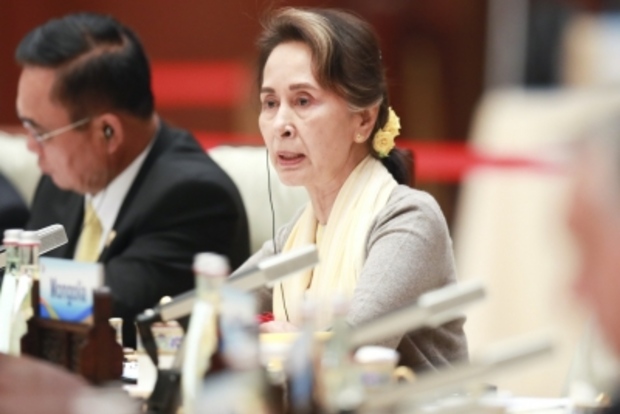Begin typing your search...
China asks all parties in Myanmar to handle differences under Constitution
China on Monday reacted guardedly to the military coup in neighbouring Myanmar ousting de-facto leader Aung San Suu Kyi and members of her governing party, calling on all to properly handle their differences under the constitutional and legal framework and uphold political stability in the country.

Beijing
Chinese Foreign Ministry spokesman Wang Wenbin told a media briefing here after being asked for China’s reaction to the coup that "we have noted what happened in Myanmar, and we are learning more information.”
“China is a friendly neighbour of Myanmar. We hope that all parties in Myanmar will properly handle their differences under the constitutional and legal framework and uphold political and social stability,” he said, parrying questions over reports that the coup was a setback to Beijing, especially to the USD nine billion China-Myanmar Economic Corridor (CMEC), which provides access to China to the Indian Ocean.
He also declined to answer the question whether China would join several other countries who have condemned the coup.
“I stated China's position on this issue,” Wang said and reiterated Beijing’s stand that all parties should properly handle their differences.
The seizing of power by Myanmar's military triggered an avalanche of condemnation and a demand for the restoration of democracy in the coup-prone country from leaders and organisations across the world.
The announcement about the coup on military-controlled Myawaddy TV came after an earlier declaration that because national stability was in jeopardy, all government functions would be transferred to military chief Senior Gen. Min Aung Hlaing.
It was also announced that the military had taken control of the country for one year and Myanmar's leader Suu Kyi and other senior figures from the ruling party have been detained in an early morning raid, the spokesman for the governing National League for Democracy (NLD) was quoted as saying in the media.
Observers say that the coup has put Beijing in a quandary as it had moved closer to Suu Kyi in recent years in sharp contrast to backing to the two-decade-long rule of the military junta.
According to reports, the military was unhappy over China’s continued backing to narco-militia known as the United Wa State Army, Myanmar’s largest ethnic insurgent army which carried out several violent attacks.
Contrary to expectations, Suu Kyi, after her election, warmed up to China despite the fact that Beijing for decades had maintained close ties with Myanmar''s military, expanding its influence in the country during her long years of incarceration.
While China defended the military, and expanded its influence during the military junta rule, Beijing has emerged influential in Naypyidaw backing Suu Kyi's government after it suffered global alienation over the Rohingya crisis.
Myanmar was the last country Chinese President Xi Jinping visited in January 2020, just days before the dreaded coronavirus hit China and later emerged as a global pandemic.
During Xi’s visit on January 17-18 last year, China and Myanmar signed 33 deals covering such areas as politics, trade, investment and people-to-people communications.
The main focus of the agreements appeared to be on the implementation of the CMEC which is akin to the USD 60 billion-dollar China-Pakistan Economic Corridor (CPEC), under which China looks to access Pakistan's Gwadar port in the Arabian Sea.
The CMEC is also a giant connectivity project linking landlocked southwestern China to the Indian Ocean. The CMEC deal included the USD 1.3 billion Kyaukhphyu deep-sea port and economic zone.
Analysts say Myanmar is of special significance to Beijing’s geo-strategic plans. The Kyaukhphyu project concerns India as it provides a stepping stone for China to the Indian Ocean.
Besides Gwadar, China also acquired the Hambantota port in Sri Lanka on a 99-year lease, raising concerns over the theory of “String Pearls” to encircle India though Beijing denies such strategic implications.
Visit news.dtnext.in to explore our interactive epaper!
Download the DT Next app for more exciting features!
Click here for iOS
Click here for Android
Next Story



